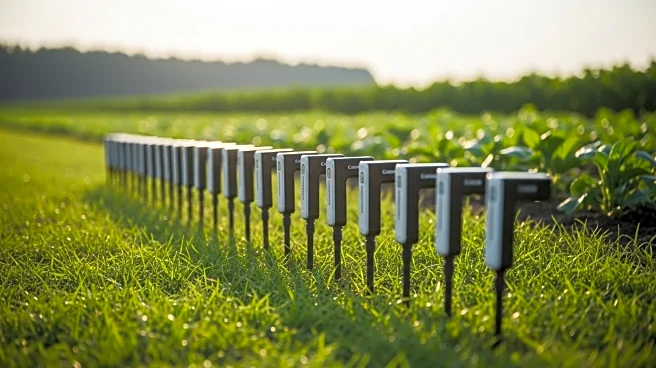What's Happening?
Verdia Diagnostics, a startup from North Carolina State University, is pioneering a new technology that uses plant sensors to detect crop diseases before visible symptoms appear. Led by CEO Zach Hetzler, the company has developed tiny, flexible sensors that attach
to plant leaves and monitor volatile organic compounds (VOCs) emitted by plants. These VOCs change when a plant is under stress due to disease or environmental conditions. The sensors use machine learning algorithms to classify these emissions, allowing farmers to identify infections up to a week before symptoms are visible. This innovation aims to provide farmers with real-time insights into crop health, transforming plants into data-generating bio-indicators. Verdia is preparing for greenhouse-scale pilot studies and plans to launch its first commercial pilots early next year.
Why It's Important?
The development of Verdia's plant sensors is significant for the agricultural industry as it offers a proactive approach to disease management, potentially reducing crop losses that account for nearly 40% of global food production. By providing early detection of diseases, farmers can take timely actions to mitigate losses, thereby improving productivity and profitability. This technology is particularly crucial for controlled environment agriculture, such as greenhouse and vertical farming, where disease management is critical. If successfully scaled, Verdia's sensors could revolutionize open-field agriculture, offering an affordable solution for disease prevention across global cropping systems. The ability to reduce global food waste and enhance sustainability aligns with broader efforts to strengthen food security.
What's Next?
Verdia Diagnostics is set to present its technology at the FAO Science and Innovation Forum in Rome, showcasing its potential to enhance global food security through early disease detection. The company plans to conduct greenhouse-scale pilot studies and aims to launch its first commercial pilots early next year. As Verdia continues to validate and scale its technology, it faces the challenge of proving economic value to growers, who operate on tight margins. The success of these pilots could lead to wider adoption of the technology, transforming disease management practices in agriculture.
Beyond the Headlines
Verdia's innovation highlights the intersection of advanced plant science and practical farm solutions, emphasizing the role of technology in sustainable agriculture. The company's approach to empowering growers with real-time, plant-level intelligence could lead to long-term shifts in agricultural practices, reducing food waste and supporting resilient agricultural systems. The ethical dimension of this technology lies in its potential to contribute to global food security, addressing one of the most pressing challenges in agriculture today.
















